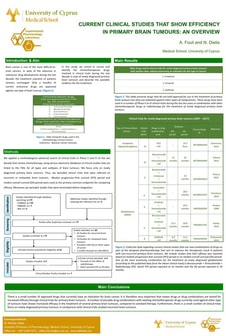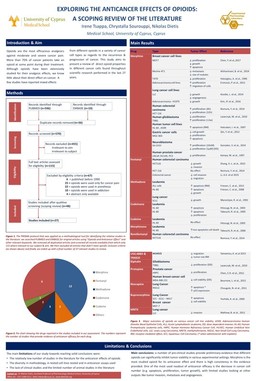Two posters presented at the 3rd Cyprus Oncology Conference (Limassol, Cyprus) - Oct. 2017
|
"Current Clinical Studies That Show Efficacy in Primary Brain Tumours: An Overview"
A. Fouli and N. Dietis Introduction: Brain cancer is one of the most difficult-to-treat cancers. In spite of the advances in anticancer drug development during the last decade, the treatment outcome of patients remains unchanged. Only a handful of current anticancer drugs are approved against any type of brain tumour. However, a significant number of current clinical trials involve chemotherapeutic treatment against different type of brain tumours. In this study, we used a systematic method to conduct the required overview of these trials in order to survey and identify the drugs involved and describe the available evidence. Methods: We applied a methodological advanced search of current clinical trials in Phase II and III that involve chemotherapy, using various electronic databases of clinical studies, for all newly diagnosed types and subtypes of brain tumours. Median progression-free survival period and |
medial overall survival period were used as the primary common endpoints for comparing efficacy.
Results: Several clinical trials in Phase II and III have been found to involve primary brain tumours. From those, a significant number involves drugs or combinations that claim efficacy in specific types of brain malignancies, compared to standard treatment. A smaller number of studies involve already-approved drugs for a type of brain cancer and investigate efficacy in a different type. Most studies involve a drug combination against a certain type of brain malignancy with preliminary evidence of increased efficacy compared to monotherapy. Very few clinical studies use drugs that are newly introduced into the indication of brain cancer.
Conclusions: Although a small number of approved drugs have an indication for brain cancer, there are clinical studies that aim to increase the number of future therapies. Nevertheless, only a fraction of these studies are able to provide solid evidence for improved outcomes compared to standard treatment.
Results: Several clinical trials in Phase II and III have been found to involve primary brain tumours. From those, a significant number involves drugs or combinations that claim efficacy in specific types of brain malignancies, compared to standard treatment. A smaller number of studies involve already-approved drugs for a type of brain cancer and investigate efficacy in a different type. Most studies involve a drug combination against a certain type of brain malignancy with preliminary evidence of increased efficacy compared to monotherapy. Very few clinical studies use drugs that are newly introduced into the indication of brain cancer.
Conclusions: Although a small number of approved drugs have an indication for brain cancer, there are clinical studies that aim to increase the number of future therapies. Nevertheless, only a fraction of these studies are able to provide solid evidence for improved outcomes compared to standard treatment.
|
"Exploring the Anticancer Effects of Opioids: a Scoping Review of the Literature"
I. Tsappa, C. Sourouppi and N. Dietis Introduction: Opioids are the most efficacious analgesics against moderate and severe cancer pain. More than 70% of cancer patients take an opioid at some point during their treatment. Although opioids have been extensively studied for their analgesic effects, we know little about their direct effect on cancer. A few studies have reported mixed effects from different opioids in a variety of cancer cell types. However, the absence of a thorough review of the literature does not allow us to assess the scope and extend of the available evidence. In this study, we used a systematic method to conduct a scoping review of the available literature in order to map the available evidence into a descriptive summarized account. Methods: We applied a PRISMA protocol as a method to identify and screen appropriate studies in the literature from 1990 to 2017. Advanced searches of the electronic databases PubMed and EMBASE were applied using relevant search terms in title and abstract. Results: From the total 606 records initially identified, 115 remained when duplicates and |
exclusion criteria-meeting articles were removed and 27 records remained after assessing the relevance to our research question. Studies concur that morphine mediates induction of apoptosis in different cancer cells in clinically-relevant concentrations. In contrast, fentanyl fails to show any effect on cancer cell proliferation. Biphalin shows a dose-biased apoptotic effect on human glioblastoma cells, whereas methadone and codeinone show similar effects to morphine in lower potencies. The anticancer effects of opioids seen are most likely non-opioid receptor-mediated, supported by evidence on the antiproliferative effect of opioid antagonists.
Conclusion: The small number of robust studies and the variability in protocols does not allow solid conclusions. However, the majority of studies to date present converged evidence which concur to a significant and clinically-relevant anticancer effect of some opioids.
Conclusion: The small number of robust studies and the variability in protocols does not allow solid conclusions. However, the majority of studies to date present converged evidence which concur to a significant and clinically-relevant anticancer effect of some opioids.

